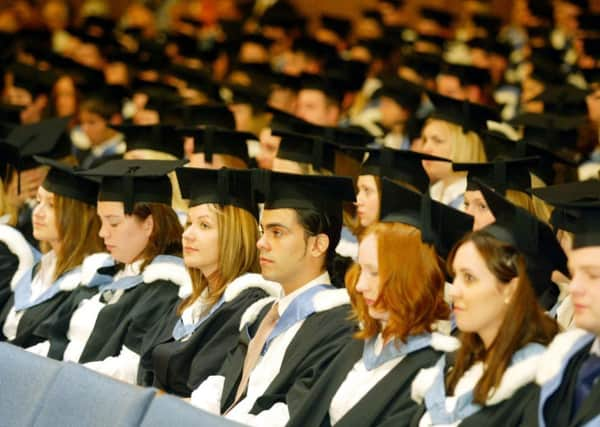Academics slam Unionist ‘hyperbole’ over education


A report by the Scottish Affairs Committee published more than two weeks ago said that separating from the UK would damage Scottish higher education and research.
Chaired by Ian Davidson MP, the report claimed that Scottish universities would face being left out of the UK Research Councils (UKRC), and therefore lose financial support from the body. The report also concludes that the Scottish Government’s discrimination against rUK students on tuition fees was not legally sustainable, which, the report suggests, would make co-operation between universities in Scotland and rUK institutions less likely.
Advertisement
Hide AdAdvertisement
Hide AdProfessor Bryan MacGregor, vice principal of Aberdeen University, and Glasgow University vice principal Professor Murray Pittock challenged the conclusions of the report, saying that the threat of exclusion from the UKRC was contrary to the values of a university and its “commitment to sharing knowledge”.
Accusing the report of “hyperbole and fiction”, the independence-supporting professors wrote: “One has to admire the doggedness of the Committee in its efforts to make the most of the bad material it has had to use but its conclusions are not supported by the limited evidence presented.”
Questioning why rUK universities would not want to collaborate with Scottish counterparts after independence, they said: “Scottish universities are renowned internationally, with five in the world’s top 200 and are winning competitive research funds at a rate of 50 per cent above the UK average based on their excellence.”
They added: “Research funding pooling occurs in many ways. There is a European Research Council which funds research across the EU and, on a smaller scale, Norway, Sweden and Denmark do not need an overarching state called Scandinavia to enable common research funding. And then there are international collaborations such as CERN. But we are asked to accept that a residual UK government will not co-operate if Scotland dares to vote Yes.”
Addressing suggestions that rUK universities might not co-operate with counterparts in an independent Scotland “intent on discriminating against UK students”, they said: “The Scottish Government are proposing simply to maintain the current system of fees without any change. Scots, Welsh and Northern Irish students all pay much less at their home countries’ universities than does a student from any of the other UK home countries. And, of course, international (that is, non-EU) students typically pay much more than EU students. This does not prevent international co-operation in research.”
The professors, members of the pro-independence Academics for Yes group, also said the Scottish Affairs Committee was overplaying the impact that independence would have on how the Scottish government would charge tuition fees.
“In the evidence in the main body of the report we discover that ‘Legal advice sought by Universities Scotland provides a potential way forward for the Scottish Government. It notes that the Scottish Government could use a maintenance grant based on residency requirements to offset fees charged to Scottish students’ - this is the current position in Ireland.
“So the worst outcome that the Committee appears to suggest is that a Scottish government would have to charge fees but could compensate Scottish resident students by paying them a maintenance award.”
Advertisement
Hide AdAdvertisement
Hide AdProf McGregor and Prof Pittock also criticised William Hague for referring to Canadians as “first cousins” with respect to embassy sharing - through which Scotland universities access global networking opportunities with the UK’s Science and Innovation Network - while suggesting that Scotland would find itself ostracised from such arrangements.
The academics’ rebuttal of the Scottish Affars Committee’s report also concluded that foreign students would find an independent Scotland’s immigration policies more amenable and flexible than those of the UK.
They wrote: “[The report] notes that Alastair Sim from Universities Scotland ‘explained the UK’s “offer” to overseas students was not as attractive as it could be when compared to its main competitors, for example, the United States, Canada and Australia. He cited the example of entitlements, such as being able to stay on post-study for a work period or bringing your spouse with you when you are doing a one-year master’s degree, as being an important part of the package in attracting students’.”
SEE ALSO